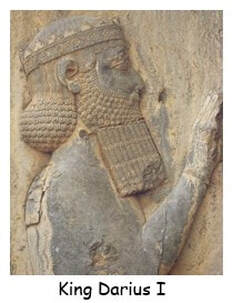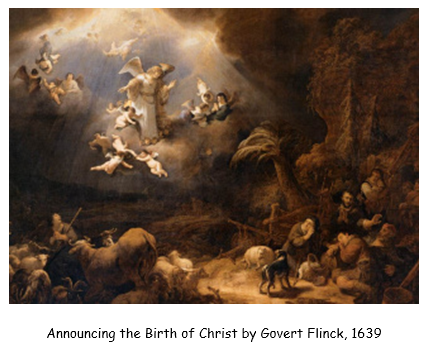|
Blessed holiday greetings to you and your family! Because of many Christmas-related activities, there is a change in the regular monthly schedule. There will only be one online lesson rather than three for this month, Sunday School will be held on December 10, December 17 will be the Christmas program, and December 24 there will be a Candlelight Christmas service. You and your family are invited to attend any or all of these events! This month’s story is titled “The Light of the Whole World,” and it is about how God announced the birth of His only Son, Jesus, to the world on Christmas Day. Children: Find a comfy spot and listen to the story being orally read to you. The story can also be found on pages 184-191 of The Jesus Storybook Bible. Nowadays, you would hear about Jesus’ birth, an amazing piece of news, on one of your electronic devices, and you would probably be able to watch a video of the event. However, back in the year when Jesus was born, there were no such things as computers, or the Internet, or TV, not even any cameras, phones, printed books, or delivered mail! But that did not bother God at all. As always, He had a plan to get out His big news. He knew He had plenty of assistants, called angels, who would gladly help to share the glad tidings! And so they did! It is almost impossible for us to imagine this glorious sight, one angel appearing followed by a massive number of other angels, singing with the greatest of joy! And have you ever heard that each of us has her/his own guardian angel? Do you have any questions or comments about angels? Pastor Steve would love to hear from you and would love to reply to you! Adults: The Biblical reference for our story is Luke 2. How many angels appeared at the birth of Jesus to the shepherds? The book of Luke, Chapter 2, is the only place in the entire New Testament where the details of the birth of Jesus and the angels that appeared are recorded. The Bible states that "a multitude of the heavenly host" (Luke 2:13) were visibly seen by shepherds shouting for joy over the birth of the Lord. How much is a "multitude?" Scripture does not say. If, however, we take Daniel 7:10 and Revelation 5:11 then at least 100 million righteous angels serve the Eternal and would be available for duty! How many of all the righteous angels in existence were allowed to show themselves in the sky just outside of Bethlehem? Although many of them appeared, it seems unlikely that every righteous spirit in existence could have visibly and distinctly manifested themselves in such a relatively small area. On a final note, Nativity scenes which portray Jesus in a manger with angels fluttering overhead promote a concept that is not Biblically correct. Angels were not where our Savior was born in Bethlehem. The Bible states that after the angels shouted for joy, they quickly went back up to heaven. It was only as the angels were leaving that shepherds made the journey into Bethlehem to find where Jesus was staying. There is no proof these spiritual messengers were as close to the Lord as some Nativity scenes show them. This Christmas, let us be reminded of the great company of angels in Heaven who rejoiced at the birth of Christ. They give us a model to follow and also reveal a side to them that we often forget: they exist in vast numbers. When you think about it, everyone has a guardian angel. That means that there must be at least 7 billion angels! And that’s only the lowest rank of angel! Just think what the whole army of angels would have been like!
Hopefully, you will be able to attend Sunday School or any of our church’s Christmas services this month! Merry Christmas! Margo Greer
0 Comments
November - Lesson 3I welcome you back for the last of our three lessons this month about
the story, “Daniel and the Scary Sleepover”, found on pages 152-159 of The Jesus Storybook Bible by Sally Lloyd-Jones. Children: Please read this exciting story out loud, maybe to a younger brother or sister, or to yourself. Could you feel the lions’ breath on your face, as Daniel did? Are you aware of their eyes staring at you? In last month’s story, we learned about the Ten Commandments (“Ten Ways to Be Perfect”). Can you tell me what commandment was broken by the people who worked alongside Daniel that got Daniel into trouble? If you think it was the tenth commandment, you are correct! Jealousy! Daniel was a really smart man who worked very hard at any job he had, and he always impressed his many bosses and kings with the great care he took with his work. He was frequently promoted to a higher level job, and the evil people who worked alongside Daniel could not or would not work as hard. They were so jealous that they lied about Daniel to the King. They secretly wanted to turn Daniel into lion food! We learn from Daniel that we need to always remember to pray, that God can protect us from anything, and that in good and bad times God is with us! Please feel free to share your thoughts or questions with Pastor Steve and others who frequent this blog. Adults: The Biblical reference for our story is Daniel 6. Throughout the Bible, there are many examples of how God protects his people, even when situations seem hopeless. The story of Daniel shows that God is always in control. He had a special plan for Daniel, as he does for each of us. Daniel was firm in his beliefs. He didn’t stop following God’s law, even though he knew it would get him in trouble. He needed to be brave and courageous and trust that God would protect him even when things seemed terrible. Throughout your life, there will be times when things are difficult. You might feel afraid or alone, but God promises to always be with you and to protect you. This doesn’t mean that your life will always go smoothly or that bad things won’t happen, however God does promise to always be with you and to use all things (both the good AND the bad) for good in your life. Final note: After Daniel escaped any harm from the lions, King Darius made a proclamation to “all peoples, nations, and languages” that everyone in his dominion must “tremble and fear before Daniel’s God” (6:25–27). This Week’s Prayer: God, I know that I can talk to You anytime, anywhere, and about anything! Amen This concludes this month’s study of Daniel. I hope you can gather with us this coming Sunday for Sunday School at 11 am right after services for a snack, a lesson discussion, and a fun craft. In prayer, Margo Greer November - Lesson 2 Hello to you once again! Glad you are able to be here! Today we are continuing our November’s story entitled “Daniel and the Scary Sleepover” found on pages 1522-159 of The Jesus Storybook Bible by Sally Lloyd-Jones. This is the second of three online lessons for this month. Children: It is time to listen to the story being read to you one more time. Maybe instead of listening to the recorded video provided to you, you would like to ask a family member to read the story to you. As you listen to the oral reader, I would like you to follow along in the book so you can check out all the cool illustrations (pictures). It took great courage and faith in God for Daniel to break the law and be obedient to God. God was faithful to Daniel and protected him from the hungry lions. All people, even adults, have their share of “lions” … things that are problems or something we are afraid of. Maybe a “lion” in your life is someone who you have allowed to upset you, or something that happened at home or school that is worrisome, or if someone you know is sick – These are all things that make us feel sad or not very happy. I'm sure Daniel thought about giving-in and hiding the fact that he was a follower of God, but Daniel decided to stand up for his belief in God, even if it meant death. There are times when even a kid has to stand up for her/his beliefs. When you see someone treating another badly. When you hear gossip. When you have the tough choice of sleeping in or going to church. When it's time to pray, and you'd rather play. When others speak negatively about God or the church. When there are things that are pulling you away from God. Distractions and “lions” come in all shapes and sizes! If you have any questions, concerns, or just thoughts to share, please use this blog to open a conversation with Pastor Steve. If you wish, create your own illustrations! Adults: The Biblical reference for our story is Daniel 6. Daniel was successful in every administration he served in, and he served all different kinds of bosses, all different types of kings. It is interesting to look into what was the cause of Daniel’s success. Based on the numerous job evaluations by others found in the Bible, Daniel demonstrated five distinct attributes that most of us believe we need in order to be successful in our own lives. #1 Commitment – the desire to remain faithful. He was committed to maintaining his own convictions, to giving his best to every kingdom, and was committed to being an example worthy of inspection. In other words, he was true to his job – he really meant business! #2 Competence – the ability to do something successfully or efficiently. Daniel was competent in wisdom and understanding (He did more than what was assigned or expected.), in specific areas of training (literature, science, engineering), and could multi-task. #3 - Courage – having the heart to serve. Daniel had courage to serve his bosses’ vision with his all, he had courage to put aside issues (like his kidnapping), and he was courageous enough to be willing to die for his beliefs. #4 Compassion – the love to meet needs. Daniel had compassion. He believed that he should share the truth with kindness (It hurt to tell the king of God’s judgment!), and it fueled his spiritual mission throughout his life #5 Creativity – the ingenuity to change and to produce change. Daniel was creative enough to embrace new leadership, to find answers, and to take on new areas of responsibility. Daniel came in as a slave, he workd and did his best, and step by step, he kept being promoted. He never asked to be promoted. He never sought a promotion. He sought excellence and that brought promotion. Daniel's ability to excel is what kept him on top! This Week’s Prayer: Dear Jesus, I ask you to help me close the mouths of the “lions” in my life. Amen Next week I will share the third and last lesson about Daniel and the lions. Our Sunday School Gathering will take place on November 26, 2023, at 11 am right after service. We will meet for a snack, a lesson discussion, and a fun craft! Have good week, Margo Greer November 2023 - Lesson 1 Happy November to you! Welcome to our Learning Together blog. Here we listen and read and imagine and create around a new story each month from The Jesus Storybook Bible by Sally Lloyd-Jones. November’s story is entitled “Daniel and the Scary Sleepover” and is found on pages 152-159. Children: Are you ready to listen to our new story being read out loud to you? Find a comfy spot, close your eyes, and imagine you are Daniel, our main character. When finished listening, you may want to draw some pictures of your own about this story, or share them with a family member or a friend. Have you ever been to a sleepover before? If so, then you probably remember being invited to a good friend’s house, eating tasty snacks, playing fun games, watching an exciting movie, and trying to stay up really late. Sounds like a good time, right? You bet it is! If you have been to a sleepover, I would like to think you have NOT been to a sleepover that had invited LIONS to the party. Oh my, that would not really be a safe choice, would it? Unfortunately, Daniel did not have a choice. He was set up. Pastor Steve will take any questions regarding Daniel’s amazing story. Feel free to contact Pastor through this blog. Adults: The Biblical reference for our story is Daniel 6. King Darius I was a king of Persia and reigned from 522 BCE until his death in 486 BCE. He ruled the Persian Empire at its territorial peak when the population was around 50 million people and it included much of Western Asia, parts of the Balkans, most of the Black Sea’s coastal regions, central Asia, the Indus Valley, and portions of northern and northwestern Africa including Egypt, part of Libya, and coastal Sudan. Upon reaching the throne, he appointed 120 provincial governors to help run his kingdom. Over these officials, he also appointed three administrators, one of whom was Daniel. Before long, Daniel displayed such remarkable ability as an administrator that King Darius planned to make him the leader of the three top officials. That was what provoked the other two administrators to gain the support of some of the governors to find a way to discredit Daniel. And by tricking King Darius, they connived to throw Daniel into a den of lions ~This Week’s Prayer: Dear God, watch over us this week and keep us safe. Remember to join us again next week for the second lesson about Daniel’s sleepover with the lions. Also, note on your calendar that this month’s Sunday School Gathering will take place on November 26, 2023. Until next week, Margo Greer Hi, Friends! Thanks for joining me today for this month’s third and final lesson about the story, “Ten Ways to Be Perfect,” found on pages 100-107 of The Jesus Storybook Bible by Sally Lloyd-Jones.
Children: I would like you to begin by reading the story again, this time to yourself or to a friend or family member. Here are the Ten Good Rules (Commandments) given to us by God: 1. Have no other gods but God.2. Do not worship statues. 3. Be careful with God’s name 4. Keep Sundays special. 5. Respect your parents. 6. Do not kill people. 7. Keep your marriage promises 8. Do not steal. 9. Do not lie. 10. Do not be jealous. The Commandments are all about showing love and respect. The first four involve love and respect for God, and the last six show love and respect for others. The Ten Commandments teach about respecting God,being honest, respecting our parents, keeping Sundayholy, and being good neighbors. These rules are as important today as they were thousands of years ago. No matter how the world changes, these Ten Commandments show us the way to a good life. Questions? Comments? Let Pastor Steve know what you are thinking. Adults: The Biblical reference to this story is Exodus 16-17, 19-40. The Ten Commandments are familiar to most people. Sometimes, people believe they are going to heaven just because they think they have not broken any of the commandments. But the unfortunate truth is, they have.Everyone has failed one time or another. However, what makes us Christians is placing our faith in Jesus. Through Jesus, our sins are forgiven. Because He died on the cross for us, we have everlasting life with God. God’s ten rules sketch out the biblical boundaries for a well-lived life and are important for every child to know. Having kids memorize these ten rules is great, but helping kids understand what it means to love and respect God and each other is even better (and more important). We, as adult Christians, need to lead our dear children by example. ~This Week’s Prayer: God, guide me to respect you and all others as I live my life. Amen I invite you and your family to attend next week’s Sunday School gathering on Sunday, October 29, at 11 a.m. right after the morning service. After a small treat, there will be a discussion of this month’s story and a fun craft. All are welcome! Enjoy the fall weather, Margo Greer Hello again! This Learning Together lesson is the second of three this month about Moses and the Ten Commandments. “Ten Ways to Be Perfect” is our current story found on pages 100-107 of The Jesus Storybook Bible by Sally Lloyd-Jones.
Children: To review, please listen once more to the story bring orally read to you, and this time, follow along in your own book. In our first lesson, you were asked to think about rules, whether rules are good or bad, and why we all need rules to follow. Maybe you have figured out that parents and other important adults in your lives care for you a great deal and want to keep you safe from harm. Rules help us to keep order, at home or at school or out in public. Why do you think God gave us these rules? Is it because God is mean and He doesn't want us to have fun, so He makes a lot of rules for people to follow? No! God likes us to have fun. Is it because God is bored and He doesn't have anything better to do than to make up rules? No! God has lots to do. God never gets bored. So, why did God give us all these rules? Just like your parents, God made rules to protect you, and everyone else. God's rules help us all to live in a way that will make us happy and won't get us into trouble with negative consequences. God made us, and He loves us. He gives us rules to help us stay safe and at peace with all. His rules bring good results for anyone who follows them. They show love and respect for God and one another. God gave His people these rules as reminders of what was good and right. Do you have any questions or comments about this story? Please use this blog to ask anything of Pastor Steve. Feel free to respond to other people’s opinions, also. Adults: The Biblical reference for this story is Exodus 16-17, 19-40. The location of Moses’ tomb is unknown. God buried him in a place which is hidden from everybody. The tombs of Abraham, Isaac, and Jacob are marked, but Moses’ tomb is still unknown. He died in Midian at the age of 120. The Bible tells us he was healthy and unimpaired when he died. Before Moses died, he reminded the people of all the Lord had done for them. The whole book of Deuteronomy is a record of what was said. Moses read the Ten Commandments to them again. He then went up into the mountain, looked into the Promised Land, and then died as God said. Today, we have someone who is greater than Moses: Jesus Christ who is still leading people out of sin. His shed blood still allows God’s fierce wrath to “pass over” those who have repented and put their trust in Him. ~This Week’s Prayer: Dear God, thank you for teaching us the way to live. In Jesus’ name, Amen Next week’s Learning Together lesson will be this month’s third and final lesson about the Ten Commandments. A reminder: Sunday School will be held on the fourth Sunday of every month, in this case October 22, at 11 am after the church service. We will talk about this story and do a fun craft. Any age is invited to attend. Have a good week, Margo Greer Hello once again! I hope you are ready to listen and read and imagine and create around the new story for this month.
This week we are beginning “Ten Ways to Be Perfect,” and it is found on pages 100-107 of The Jesus Storybook Bible by Sally Lloyd-Jones. Remember: If you want a book for yourself, feel free to come to our church (Resurrection Lutheran Church) to take your own copy from the library shelf. Another way for you to get a book would be to order online from home. Children: As you already know, if you have done a Learning Together lesson with us before, our very, very first step is always to listen to the story being read aloud to you. So, settle yourself in and get ready to hear how God’s people were given His ten rules for good living. What are your thoughts about having rules? Are rules good or bad? Maybe you think there are too many rules? Maybe you think there aren’t enough rules? And who gets to make up these rules? For example, consider what would happen if there were no traffic rules? If you wish, Google search “traffic chaos” to find video clips of tangled traffic scenes from other countries. How would that work for all of us? Feel free to blog any questions or comments that you may have to Pastor Steve. Adults: The Biblical reference for this story are Exodus 16-17, 19-40. Moses – He is the man of the hour in this story! Moses had an amazing life that was exciting, disappointing, and scary. He was given up as a baby because his mother wanted to save him. He was rescued by Pharaoh’s daughter and raised in Pharaoh’s house with all the privileges. He realized God’s calling on his life and was willing to give up his life of luxury, his position, and his future in order to follow what God wanted for His people. Moses ended up being the leader of God’s people who defied Pharaoh and led them out of Egypt and toward the Promised Land. After God rescued the people of Israel from slavery in Egypt, he visited personally with Moses and gave him the 10 Commandments so that they could know how to live as God’s people, reflecting God’s own light and life into the world. Through all of this, Moses learned to trust in God and His plan for his life. He learned that life is better when God is in control. In return, God showed Moses that He is a faithful God even when it doesn’t look like He is present. God is always there. ~This Week’s Prayer: Thank You, dear God, for providing life rules for us in the Ten Commandments. Amen Two more online Learning Together lessons will follow in the next two weeks, and you are invited to a meet-in-person Sunday School to be held on October 17, 2023, at Resurrection Lutheran Church. There will be a tasty snack, a discussion of the story, and a fun craft project. Hope to see you then! Have a good week, Margo Greer Welcome back to our third week of Learning Together! I am glad you can
join us in our last online lesson this month about the story “God Makes a Way.” This story is found on pages 92-99 of The Jesus Storybook Bible by Sally Lloyd-Jones. Children: This week I would like you to reread the story yourself, aloud or silently, or maybe read the story to another family member or friend. Was it hard for God’s people to trust God that He would save them from the soldiers and the Red Sea? What do you think they must have been thinking as they walked through the pillars of water to the other side? What would YOU be thinking at such a moment? Is it hard for us, God’s people nowadays, to trust in God? Why is it so difficult at times to trust? What can we do to make our faith stronger? Please share any of your thoughts and comments with all of us on our RLC blog! Pastor Steve will enjoy hearing your opinions and how you feel about the story. Adults: The Biblical reference for this story is Exodus 14-15. To complete our discussion of three adult modern-day truths learned from the Red Sea miracle, our last is We Are Never Alone. (The first two are God Can Be Trusted and Focus On God, Not The Problem.) Just as God did not leave the Israelites alone in their fleeing from Pharaoh and the Egyptian army, God will never leave us alone. The Lord promises to be with us every step of the way. Even when we think we are alone, we are not. Whether we are walking down the street or we are sitting alone in a room, the Holy Spirit consumes the space around us. This can bring great comfort to your soul and give you peace. We can overlook this particular truth while reading the account of the Red Sea miracle because all we see is that God parts the Red Sea for Israel. We do not equate God doing the same for us. However, as believers in Christ, we are now all chosen, as were the Israelites, and dearly loved by God. The parting of the Red Sea is a major turning point in the Bible during Israel’s exodus from Egypt. Without God’s provision, the Israelites would have been recaptured, re-enslaved, or even killed by Pharaoh and his army. Thankfully, the Israelites were not alone because God was with them. In the same way, God can help us “part” the Red Seas in our lives and give us relief from our troubles. Your comments/questions as adults are also important to our discussions. Pastor Steve appreciates others’ opinions Please feel free to respond on this blog. ~This week’s prayer: I thank my dear Lord for surrounding me with His Holy Spirit. Amen This lesson concludes our online study of “God Makes a Way”. This coming Sunday, September 24, Sunday School will meet at 11:00 am. after church services to discuss our story and do a craft. Hope to see you there! ~Margo Greer Hi Friends! Here is the second September week of Learning Together and
another opportunity to listen and read and imagine and pray around this month’s selected story, “God Makes a Way”, found on pages 92-99 of The Jesus Storybook Bible by Sally Lloyd-Jones. Children: At the close of the first lesson, I asked you to imagine you are one of God’s people who had made it to the Red Sea only to look back and see the Pharaoh, his chariots, and his soldiers coming to re-capture you! What words came to mind? Listen to the story being read aloud to you again, but this time, I would like you to follow along in your own books. Check out each picture, which is also called an illustration, as you listen. You can always pause the video if you need more time. Maybe you would like to draw your own illustration(s) or write out the story in your own words. (Remember, books are available for free at our church or could be ordered online.) Can you answer the following important story questions about the miracle of the parting of the Red Sea? *How were God’s people trapped? (The pharaoh and his soldiers were coming from behind, and the Red Sea, too large to swim, was in front of them.) *How did God save His people? (God caused a strong wind to blow that parted the water into two towering walls on either side, and God’s people could walk through on dry land to the other shore.) *What happened to the Pharaoh and his soldiers when they tried to follow God’s people through the pillars of water? (The walls of water crashed back down on them, and they all drowned.) We will discuss each of these questions at our Sunday School meeting on 9/24 at 11 am. If you would like to ask Pastor Steve, our interim pastor, any questions or offer any comments about this story, please do so on this blog. He will respond to you. Adults: The Biblical reference for this story is Exodus 14-15. As you may recall, the adult section of last week’s lesson spoke of the first of three truths that we as adults can learn from the miracle of the parting of the Red Sea (God Can Trusted). Here is second truth: Focus on God, Not The Problem. The Israelites were afraid of Pharaoh and the Egyptian army storming behind them, but they did not need to be ruled by fear because they had Someone the Egyptians didn’t - God. Sadly, the Israelites created a historical habit of doubting God and grumbling against Him and Moses, yet God did not punish them, but rather, He parted the Red Sea and delivered His chosen people despite their sin. Instead of focusing on the problem (Pharaoh and his army), the Israelites needed to focus on God. In our lives, we need to do the same. In our present-day, hectic lives, it can be hard not to obsess over our problems, but the Lord does not want this for His children. Anxiety, stress, and worries need to be given over to the Lord. Give all of your concerns to Him. God will give us peace if we ask. No matter what your problem is, God is bigger. We should always keep our eyes focused on Jesus. Like the Israelites, we have Someone too! As with Pastor Mary, our interim pastor. Pastor Steve, will welcome and respond to any adult questions or comments on this blog. ~This week’s prayer: I pray that I will put my fears and worries in God’s hands each and every day. Amen There will be one more online lesson for “God Makes a Way” next week, and then Sunday School is meeting on September 24 at 11 am. for discussion and a craft. So long for now, Margo Greer Welcome back after our summer break to the first of the 2023-24 online Learning Together/Sunday School series! As before, each month we will explore a new Bible story with three weekly online lessons, and we will meet as a Sunday School on the fourth Sunday of each month, from 11 am. to 11:45 am., to discuss each story and do a craft. You and your family are invited to listen and read and create and pray around the selected story, which this month is ”God Makes a Way.” It is found on pages 92-99 of The Jesus Storybook Bible by Sally Lloyd-Jones. If you would like your own copy, our church has extra copies to give to you, to keep as long as you would like. Children: Please begin by listening to the story read aloud to you in our Learning Together email. As you listen, close your eyes, and imagine you are one of God’s people who is fleeing from the Pharaoh, an Egyptian king. He had been holding you and the rest of God’s people as slaves for years. After he finally agreed to set you free (Remember the 10 plagues?), he changed his mind and wanted you back to be his slaves again. How would you feel when you saw the chariots and soldiers chasing you down? Adults: The Biblical reference for this story is Exodus 14-15. The parting of the Red Sea is a story that many people hear in Sunday School. However, not many people associate the parting of the Red Sea with their adult life; it seems grownups leave this miracle tucked away in a child's picture Bible. There are several truths we as adults can learn from this groundbreaking miracle. Here is the first one: God Can Be Trusted. Often, we can be guilty of not trusting God. Rather than trusting God, we tend to worry, fret, and panic. The parting of the Red Sea reminds us God can be trusted. The Lord divinely protected the Israelites from the Egyptians by day and by night. Pharaoh and his army were on the heels of the Israelites; they were going to overpower and recapture the Israelites. Despite the odds, the Israelites escaped the clutches of Pharaoh and his Egyptian army because of God's gracious plan. When we read this account of the parting of the Red Sea, we often forget that God did the impossible and protected the Israelites by giving them dry land to cross. No mere person could make a dry path in the midst of the Red Sea as it was done by the mighty hand of God. Since God did this amazing feat for Israel, why is it so difficult for us to trust Him with the troubles of our lives? Instead of giving in to the constant worry in our heads, we need to dive deep into the love of God and simply trust Him. 1 Peter 5:7 tells us, “Cast all your anxiety on him because he cares for you.” God knows every single problem, worry, and anxious thought in our hearts and He yearns to relieve us of this burden. We can trust God because He has proven Himself faithful not only by parting the Red Sea, but also by redemption through the death, burial, and resurrection of Jesus. If we can trust God with the salvation of our souls, we can definitely trust Him in our everyday lives. Trust God and lean on Him. He will never fail you. ~This week’s prayer: Thank you God for hearing our prayers. Amen
There will be two more lessons online this September about the “God Makes a Way” story. This month’s Sunday School will meet at 11:00 a.m. on Sunday, September 24, after church services. All are welcome to join the discussion and enjoy a craft. Have a safe week! Margo Greer |
Archives
April 2024
|
|
Like us on Facebook.
If you haven't already, please take a moment to like RLC on Facebook and follow us for updates and photos. CLICK HERE.
Copyright 2023. Resurrection Lutheran Church, New Berlin, WI
|
RESURRECTION LUTHERAN CHURCH
Steve Rutter, Pastor (pastorsteverlc23@gmail.com) Julie Johnson, Worship Music Coordinator Steph Albert, Worship Music Larry Gnatzig, Office Administration 12400 West Coldspring Road New Berlin, Wisconsin 53151 262.786.8880 rlcnewberlin@gmail.com |




 RSS Feed
RSS Feed

